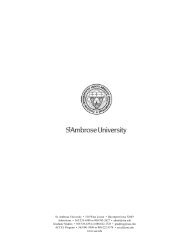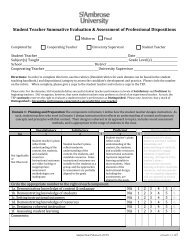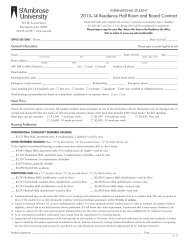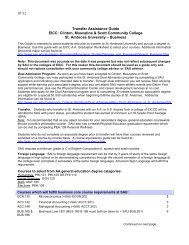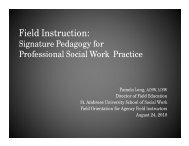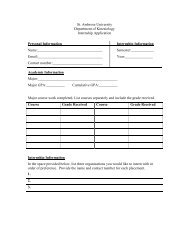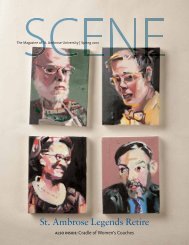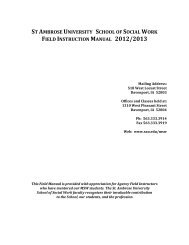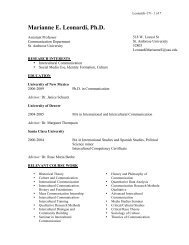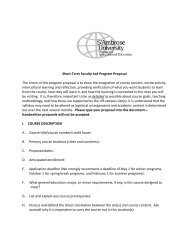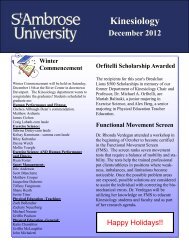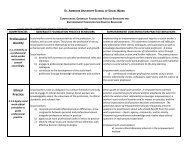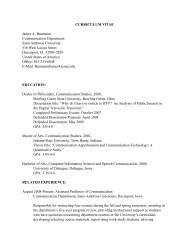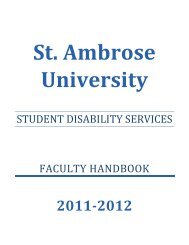St. Ambrose University 518 West Locust Davenport Iowa 52803 admit
St. Ambrose University 518 West Locust Davenport Iowa 52803 admit
St. Ambrose University 518 West Locust Davenport Iowa 52803 admit
Create successful ePaper yourself
Turn your PDF publications into a flip-book with our unique Google optimized e-Paper software.
Undergraduate Programs<br />
the goals and values of human existence, and<br />
how life should be led. Utilizes both literary and<br />
philosophic sources to raise questions concerning<br />
the self, and the relation of the individual to<br />
other persons.<br />
+PHIL 210. Social/Political Philosophy 3 credits<br />
Philosophical analysis of social process as well as<br />
an attempt to develop the criteria for judging<br />
political institutions. Individuals such as Plato,<br />
Aristotle, Aquinas, Hobbes, Locke, Mill and<br />
Marx may be considered.<br />
+PHIL 217. History of Ancient<br />
Philosophy<br />
3 credits<br />
Introduces the history of western philosophy by<br />
examining the positions of, among others, the<br />
Pre-Socratics, Plato and Aristotle. Course is a<br />
study of philosophical thought characteristic of<br />
the period 600 B.C.E. to 400 C.E.<br />
300- and 400-level courses require completion of<br />
at least one course at the 100- or 200-level.<br />
+PHIL 302. Peace and Justice Seminar 3 credits<br />
Coordinated by faculty from theology, philosophy<br />
and sometimes by an instructor from another<br />
field. The course is part of the interdisciplinary<br />
minor in peace and justice. Research project<br />
required. Recommended prerequisite: PHIL 207,<br />
219, or THEO 280. (Same as THEO 302)<br />
+PHIL 305. Business Ethics<br />
3 credits<br />
<strong>St</strong>udy of ethical principles and the application of<br />
ethical principles to situations relevant to decision-making<br />
in the professional and business<br />
world. <strong>St</strong>udents will be expected to reflect on<br />
question-raising situations that demand careful,<br />
informed moral deliberation.<br />
+PHIL 310. Bio-Medical Ethics 3 credits<br />
Detailed study of ethical principles and the application<br />
of those to situations relevant to decisionmaking<br />
in medicine and the life sciences.<br />
Particular emphasis on such topics as the termination<br />
of life, the allocation of scarce resources<br />
and genetic research. Prerequisite: PHIL 207 or<br />
instructor permission.<br />
+PHIL 311. Environmental Ethics 3 credits<br />
Discusses environmental issues, analyzes philosophical<br />
and theological responses, calls for<br />
an evaluation of those responses and challenges<br />
the students to draw their own critical conclusions.<br />
Prerequisite: PHIL 101, THEO 101 or<br />
instructor permission. (Same as THEO 311,<br />
ENVR 311)<br />
PHIL 325. Ethical and Logical Issues<br />
in the Mass Media<br />
3 credits<br />
<strong>St</strong>udy of the basic principles of formal logic with<br />
particular emphasis on fallacious reasoning and<br />
the subsequent application to the various modes<br />
of reasoning found in the mass media.<br />
Recommended prerequisite: PHIL 207.<br />
+PHIL 342. Ethics of Sexuality 3 credits<br />
Detailed study of human sexuality and the ethical<br />
reasoning pertinent to it for the purpose of<br />
formulating a rational and cohesive sexual ethic.<br />
+PHIL 343. Ethics of Peace and<br />
Non-Violence<br />
3 credits<br />
An inquiry into the concepts of peace and justice,<br />
the methods of conflict resolution, and the various<br />
dimensions of a peaceful world. Among others,<br />
the positions of Mahatma Gandhi, Martin<br />
Luther King Jr. and Thomas Merton are examined.<br />
Recommended prerequisite: PHIL 207.<br />
+PHIL 360. History of Medieval<br />
and Renaissance Philosophy<br />
3 credits<br />
Examination of the philosophical thought characteristic<br />
of the period 400–1550. Among others,<br />
looks at thinkers whose positions reflect the<br />
Christian world view, such as Augustine and<br />
Thomas Aquinas. Prerequisite: PHIL 217 or<br />
instructor permission.<br />
+PHIL 365. History of 16th to 18th<br />
Century Philosophy<br />
3 credits<br />
Examination of the positions of thinkers who<br />
lived within the period 1550–1800, among others<br />
Descartes, Hume and Kant. Considers such topics<br />
135



